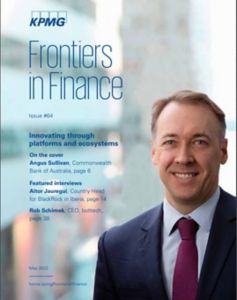BlackRock has always been somewhat of a platform player. “From the very first days, BlackRock recognized that running an asset management business was — in many ways — an exercise in information processing and to do that well — and at a scale — you need technology,” says Aitor Jauregui, Country Head for BlackRock in Iberia. “From the time BlackRock was founded, our Aladdin platform has been core to that proposition.”
Aitor describes Aladdin (an acronym for Asset, Liability, Debt and Derivative Investment Network) as a comprehensive investment management and trading platform. But in practice, it is much more than that. Aladdin combines sophisticated risk analytics with comprehensive portfolio management, trading and operations tools on a single unified platform. It is used by thousands of investment professionals around the world. And it underpins a massive proportion of the world’s financial ecosystem.
It is also at the heart of BlackRock’s own success. On the one hand, BlackRock investment managers use the platform to drive their day-to-day investments. But, at the same time, the firm also offers the platform to clients, allowing them to tap into the same technology and intellectual capital available to BlackRock’s own employees. In other words, it serves as both a core business platform and an outsourced service offering.
Keeping ahead of customer trends
BlackRock’s platform may be market leading, but to keep that pole position, the global investment leader is striving to ensure that the platform remains relevant to its customers and users. And that means identifying — and getting ahead of — emerging customer and market trends. Climate change and sustainability likely rank among the most pressing.
“Every client wants to talk to us about sustainability. It is becoming a core element in all portfolios. And every part of our ecosystem is keen to get more granularity and better capabilities in this area,” notes Aitor.
Larry Fink’s Letter to CEOs at the start of 2020 catapulted his firm into the climate change agenda. In the accompanying Client Letter, BlackRock laid out its vision to make sustainability the firm’s new standard for investing. Sustainability would play a stronger role in the active investment processes and environmental, social and governance (ESG) risk would be better accounted for in active strategies. Transparent sustainability data would be provided for a range of products. And Aladdin would play a key role in enabling this vision.
At that point, BlackRock was already a leader in measuring and reporting sustainability risks in their investments. ESG scores and carbon footprint measurements were readily available for iShares funds. And the firm’s Carbon Beta tool was allowing managers to stress-test portfolios against various carbon pricing scenarios. Since Larry Fink’s now infamous Letter to CEOs, the focus on incorporating sustainability into every facet of Aladdin has sharpened.
“We are very committed to providing Aladdin clients with access to the capabilities they need to incorporate climate risk, transition risk and the analysis of sustainability risks into their investment process,” explains Aitor. “And we are continuously growing our capabilities and our ecosystem to deliver that.”
Since the start of 2020, Aladdin has added nearly 30 high-level sustainability index scores from leading data providers. They’ve integrated new ESG data fields from groups like MSCI and Sustainalytics into the platform. And they are partnering to expand the offering, including a strategic partnership with Clarity AI (a tech-driven sustainability measurement start-up) and the acquisition of Baringa Partner’s Climate Change Scenario Model.
Sustainability isn’t the only evolving customer trend driving the evolution of the Aladdin platform. Many institutional investors and wealth clients, for example, are starting to increase their allocations towards private market assets and investments.
The firm also recently launched Aladdin Climate, a tool that allows portfolio and risk managers to see climate-adjusted analytics alongside their standard datasets as they make decisions. And that sits within Aladdin’s wider sustainability offering which aims to help investors understand and integrate ESG and climate metrics across the investor workflow.
“As we promised back in 2020, we’ve been hard at work putting sustainability at the very heart of Aladdin,” adds Aitor. “And at every step, we’ve been listening to our clients and working to understand their needs in this area.”
Consistency at the core
Sustainability isn’t the only evolving customer trend driving the evolution of the Aladdin platform. Many institutional investors and wealth clients, for example, are starting to increase their allocations towards private market assets and investments. And that is driving increased demand for better and more consistent data across both private and public markets.
“As more investors incorporate alternatives into their portfolios, the ability to seamlessly manage portfolios across public and private asset classes on a single platform is critical,” said Rob Goldstein, Chief Operating Officer of BlackRock,1 when the firm announced the acquisition and integration of eFront, an end-to-end alternative investment management software and solutions provider.
Similarly, clients are also shifting their views on portfolio construction. “We’re giving investors the information they need in order to become much more strategic about building their portfolios. At its heart, Aladdin is all about providing investors with common risk reporting data in a way that allows them to properly monitor their assets and construct portfolios,” Aitor added.
Value-focused and technology-driven
Ultimately, this focus on delivering consistent and timely data to investors is what has enabled BlackRock’s Aladdin platform to remain relevant and value-focused.
“By continuously improving the platform, responding to client needs and building our capabilities, we are bringing clarity and connectivity to the world’s financial ecosystem. And by providing a common language across the investment process, we are helping our clients to make more informed decisions, scale efficiently and achieve better investment outcomes,” says Aitor. “That’s how the Aladdin platform stays one step ahead.”
Aitor is convinced that technology will be the key to managing these and future trends for the asset management industry. “In order to run an asset management business at scale, you need technology. Not just to grow efficiency, but also to provide clients and investors with the information they need in order to allow them to embrace change in the markets. Today’s asset managers really need to put technology at the center,” he added.
This article is featured in Frontiers in Finance – Innovating through platforms and ecosystems
Explore other articles › Subscribe to receive the latest financial services insights directly to your inbox ›
Connect with us
- Find office locations kpmg.findOfficeLocations
- kpmg.emailUs
- Social media @ KPMG kpmg.socialMedia
Stay up to date with what matters to you
Gain access to personalized content based on your interests by signing up today






